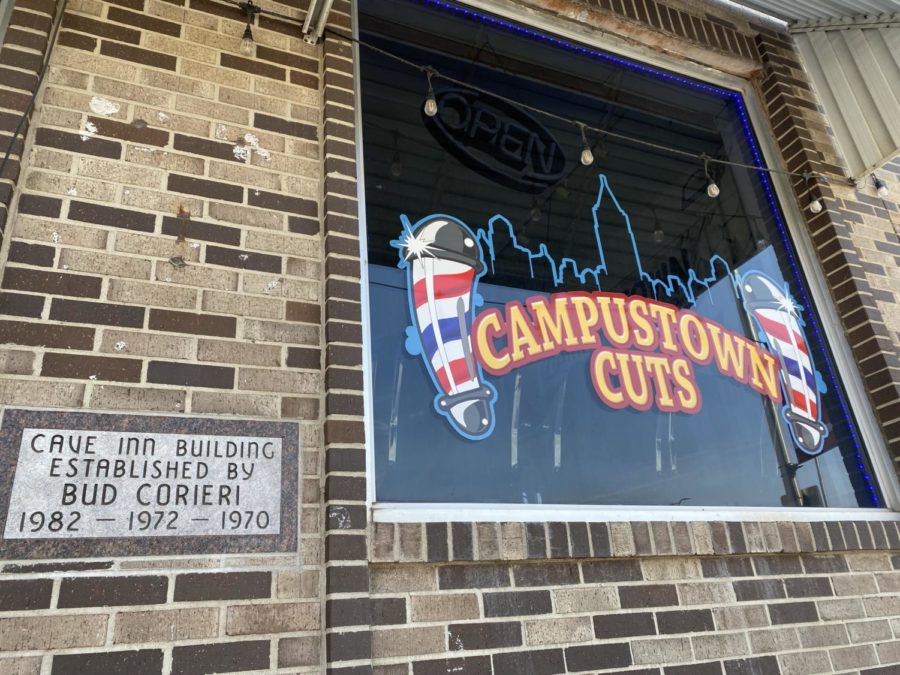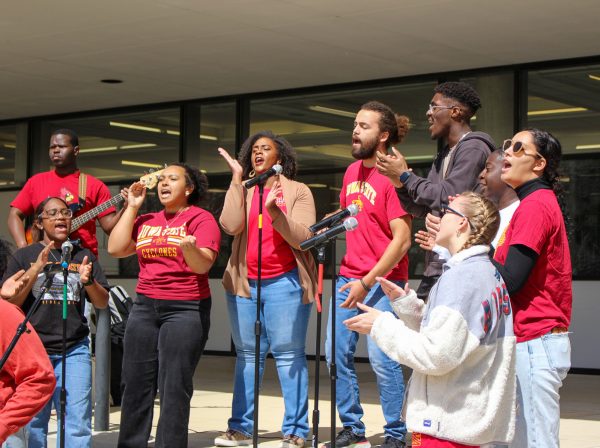ISU students and Ames residents express limited access to inclusive hair care
Campustown Cuts is located at 126 Welch Ave.
When Dee Sims moved to Ames in 2019, she saw a need for hair and beauty products for Black women. This led her to open Essence of Natural Beauty, a beauty supply store located in the North Grand Mall.
Local businesses like Campustown Cuts and Essence combat the community’s lack of diversity in hair care resources, but they are among the minority of available options.
Essence, which Sims started in 2019, is a black-owned, woman-owned local business that offers the largest selection of wigs and braids in Ames.
“I was like, I can’t stay here if I don’t have a beauty supply store, so I had to open one up,” Sims said. ”And it wasn’t only for myself; it was for my daughter because I wanted her to see that there are other brown people just like her.”
Sims opened Essence without a loan while she was putting her daughter through school. She said it was difficult to start a beauty supply store in Ames because Iowa’s market for African American hair products is small.
“It takes people to make things for themselves,” Sims said. “I understand that Ames is just lacking, but we just need more people who are willing to do it.”
Sims said cities like Chicago, which has a variety of beauty supply stores, can afford to have lower prices and can secure contracts with vendors much quicker than she can in Ames.
“When someone like myself tries to secure a contract with one of the major brand name companies that customers are looking for, it’s hard for me to secure that because they’re asking me to spend $30,000 to $45,000,” Sims said.
Despite the market, Sims said she had many motivations for opening Essence.
“For one, it’s a cultural purpose,” Sims said. “I mean, you want to feel welcome in the town that you’re living in. Having a store like this not only makes me feel welcome, but it makes other people feel welcome, and they want us to stay here.”
Sims said when she opened the store, she noticed the African American population in Ames made up 2% of the residents.
“It has since grown since I opened this store, and I’d like to think that I have something to do with that because people like me are staying in this area because they see that there are places they can go to where they can look good,” Sims said.
In 2015, Joseph Evans started Campustown Cuts, a barbershop specializing in fades and cuts for every hair type.
The shop’s client base is 70% ISU students, most likely from a different city, state or country, and 30% locals, according to Evans.
“One thing a lot of people worry about when they come to school here in Ames is ‘am I gonna be able to find a good barber?’” Evans said. “[It] makes us feel good knowing we took that little burden off of someone.”
Evans said Campustown Cuts is successful because their barbers can cut any hair type, including multicultural and textured hair.
“I would say we cut all types of hair, which is why we are so busy,” Evans said. “Being at Campustown, I have cut people from every part of the world, and it feels good knowing they have a place that can get their hair cut right.”
Evans recently opened CTC Barber Academy, located at 137 Lynn Ave. in Ames.
“I opened this academy not only to train barbers to learn what I’ve learned over 15 years of my barbering career, but I wanted to offer cheap haircuts for the town and ISU students who can’t afford to get a haircut at Campustown Cuts,” Evans said.
Kierra Jack, a junior in interior design, said she and many of her peers order hair products online or travel outside of Ames to purchase what they need. Many look to Des Moines for their hair care needs, roughly 36 miles away.
“Finding hair care products for ethnic hair is almost impossible for certain hair types,” Jack said. “Chain stores like Walmart, Target, Walgreens, etc. all provide the same basic products for ethnic hair.”
Jack said she feels Ames needs more resources for people of color.
“Being that this city is predominantly white, the lack of hair resources is probably because the different hair types aren’t common knowledge to all,” Jack said. “The hair categories aren’t just straight, wavy, and curly but there’s a whole spectrum of hair types.”
The 1A-4C hair scale is a tool many Black women use to categorize their natural curl patterns. This scale is broken into four categories by texture; 1A-C being “straight” hair textures, 2A-C “wavy,” 3A-C “curly” and 4A-C “kinky.”
Jack said that since people of color have a wide variety of hair types, having only three to five different brands available is not inclusive.
“Overall, what’s missing is a variety of hair care products,” Jack said. “I have type 4C hair and there are a million products just for that single type of hair. There are brands that may work for my friends who are that type for hair that don’t work for me.”
Jack said proper hair care greatly impacts her life because it plays a big role in her culture and self-identity. Working with type 4C hair, Jack has to schedule in wash days.
“It’s funny because not a lot of people know what a wash day is,” Jack said. “But basically having my hair type, I have to schedule out six hours to do my hair, and that’s not even doing an extensive over-the-top hairstyle.”
Jack said washing and conditioning take at least an hour, with another hour needed for detangling and moisturizing.
“Depending on my style, there’s an additional one to six hours,” Jack said. “It’s stressful and can be time-consuming, but it is worth it to me personally.”
Sims agreed that proper hair care is important because it plays a large role in how a person carries themselves on a daily basis.
“[Our hair] is our everything; it’s our essence,” Sims said. “It’s what gives us our confidence to go out and do what we do.”
Your donation will support the student journalists of the Iowa State Daily. Your contribution will allow us to purchase equipment, send our student journalists to conferences and off-set their cost of living so they can continue to do best-in-the-nation work at the Iowa State Daily.















